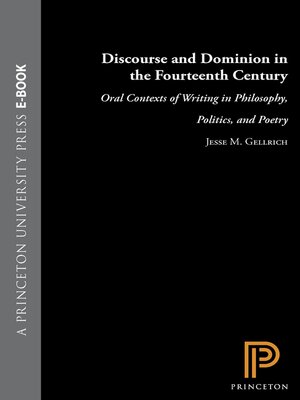Discourse and Dominion in the Fourteenth Century
ebook ∣ Oral Contexts of Writing in Philosophy, Politics, and Poetry
By Jesse M. Gellrich

Sign up to save your library
With an OverDrive account, you can save your favorite libraries for at-a-glance information about availability. Find out more about OverDrive accounts.
Find this title in Libby, the library reading app by OverDrive.



Search for a digital library with this title
Title found at these libraries:
| Library Name | Distance |
|---|---|
| Loading... |
This wide-ranging study of language and cultural change in fourteenth-century England argues that the influence of oral tradition is much more important to the advance of literacy than previously supposed. In contrast to the view of orality and literacy as opposing forces, the book maintains that the power of language consists in displacement, the capacity of one channel of language to take the place of the other, to make the source disappear into the copy. Appreciating the interplay between oral and written language makes possible for the first time a way of understanding the high literate achievements of this century in relation to momentous developments in social and political life.
Part I reasseses the "nominalism" of Ockham and the "realism" of Wyclif through discussions of their major treatises on language and government. Part II argues that the chronicle histories of this century are tied specifically to oral customs, and Part III shows how Sir Gawain and the Green Knight and Chaucer's Knight's Tale confront outright the displacement of language and dominion. Informed by recent discussions in critical theory, philosophy, and anthropology, the book offers a new synoptic view of fourteenth-century culture. As a critique of the social context of medieval literacy, it speaks directly to postmodern debate about the politics of historicism today.






